Select Language
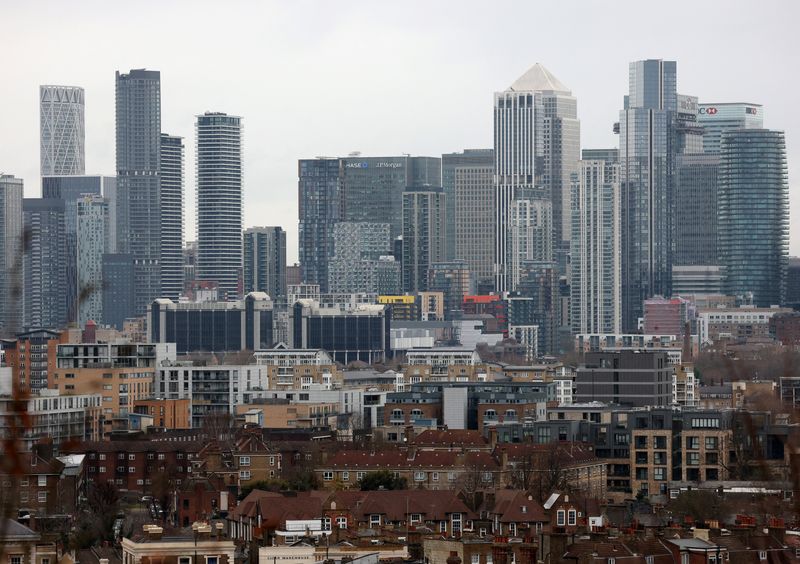
LONDON (Reuters) - Britain’s housing market had its slowest month in more than a year in February as a rush by buyers to close deals ahead of the expiry of a tax break ran out of steam, a survey published on Thursday showed.
The Royal Institution of Chartered Surveyors said buyer demand was the weakest since November 2023 and a further softening was expected in the months ahead.
The report’s net balance of house prices - which measures the difference between surveyors reporting a rise and a fall -dropped to +11 - its lowest since September last year - down from +21 in January and a two-year high of +25 in December.
The figure was below all forecasts in a Reuters poll of economists which had pointed to only a slight slowdown.
Britain’s housing market gathered speed in recent months, helped by expectations of Bank of England interest rate cuts and by buyers seeking to beat a March 31 expiry of tax breaks for purchases of less expensive homes and for first-time buyers.
But that flurry of activity appears to have cooled now with time almost running out to beat the deadline.
RICS Chief Economist Simon Rubinsohn linked the slowdown to the expiry and to worries about inflation pressures caused by global uncertainty, which has spiked since Donald Trump took over as U.S. president.
"That said, looking beyond the next few months, sales activity is seen as likely to resume an upward trend with prices also moving higher," Rubinsohn said.
In the property rentals market, tenant demand contracted for a fourth month in a row, the longest such stretch since collection of the figures began in 2012.
But a net balance of +34% of survey participants expected rents to rise in the coming three months as the flow of properties coming on to the market dries up more quickly than demand.
Prime Minister Keir Starmer has promised to speed up house-building to help tackle the shortage of homes in Britain.

By Amy Lv and Lewis Jackson
BEIJING (Reuters) - Iron ore futures surrendered early gains to trade lower on Wednesday, as sentiment was spooked by resumed market talks of China’s plan of trimming crude steel output to rein in oversupply plaguing the industry.
The most-traded May iron ore contract on China’s Dalian Commodity Exchange (DCE) ended daytime trade 0.32% lower at 769.5 yuan ($106) a metric ton after touching an intraday high of 785 yuan a ton earlier in the session.
The benchmark April iron ore on the Singapore Exchange (OTC:SPXCY) slipped 0.8% to $99.95 a ton, as of 0744 GMT after touching the highest since March 3 at $102.05 a ton earlier.
The weakness came after market speculation that details for China’s steel output control have been finalized and will be made public later this week.
China’s National Development and Reform Commission, its state planner, did not respond to Reuters’ request for comment.
The state planner unveiled its plan on March 5 to curtail crude steel output this year, without specifying details on the volumes to be cut and from when.
Some market participants had speculated that steel output could be cut by 50 million tons this year.
A reduction in steel output will lower consumption of steelmaking feedstocks.
Ore prices rose in morning trading as investors bet on a pick-up in near-term demand for the key steelmaking ingredient after the conclusion of China’s annual parliament meeting.
Some steel mills, which had started maintenance on their blast furnaces, gradually resumed operations driven by decent margins and signs of improving demand, analysts at consultancy Mysteel said in a note.
Steel benchmarks on the Shanghai Futures Exchange gained ground. Rebar added 0.59%, hot-rolled coil rose 0.63%, wire rod climbed 0.29% and stainless steel ticked 0.71% higher.
Other steelmaking ingredients on the DCE advanced, with coking coal and coke up 0.8% and 0.06%, respectively.
($1 = 7.2461 Chinese yuan)
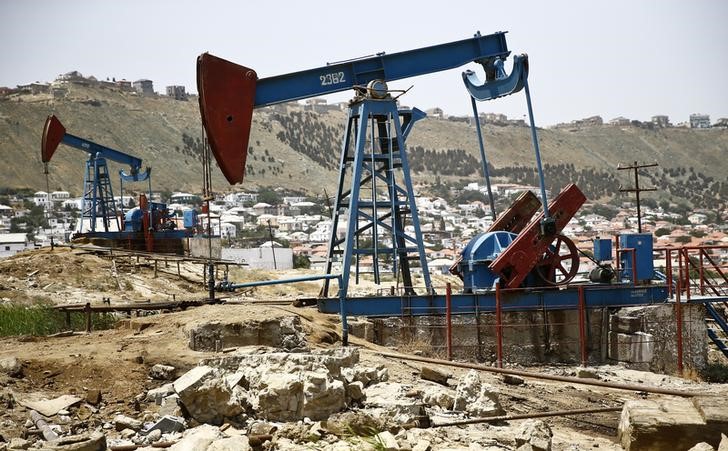
Investing.com-- Oil prices rose in Asian trade on Wednesday, recovering mildly after increased concerns over U.S. trade tariffs and slowing economic growth dragged prices to over three-year lows.
Focus was now squarely on a monthly report from the Organization of Petroleum Exporting Countries (OPEC) for more cues on supply, especially after the cartel agreed to begin increasing production earlier this month.
Oil gained some ground this week after plummeting to more than three-year lows, although sentiment remained largely on edge amid persistent concerns over slowing demand and tariff-related disruptions.
Expectations of some supply disruptions in Russia also aided prices, after Ukraine claimed it had attacked a major oil refinery in Moscow. This came after Kyiv agreed to a tentative ceasefire deal brokered by the U.S., which Moscow is yet to accept.
Brent oil futures expiring in May rose 0.5% to $69.92 a barrel, while West Texas Intermediate crude futures rose 0.6% to $66.30 a barrel by 21:34 ET (01:34 GMT).
Canada threatens oil export curbs over US tariffs
Oil markets tumbled over the last three weeks on concerns over increased tariffs under U.S. President Donald Trump, who had last week imposed 25% tariffs on Canada and Mexico, and a 20% duty on top oil importer China.
While Trump did order temporary relief for Canada and Mexico, the countries, along with China, announced their own retaliatory measures, marking the beginning of a global trade war.
Canadian officials threatened to limit energy exports to the U.S.- a scenario that could spur some tightening in oil supplies. But such measures will be contingent on the U.S. imposing steeper tariffs.
Trump has largely kept up his threats of reciprocal tariffs, which he says will be imposed in early-April.
OPEC report awaited for demand, supply cues
Focus on Wednesday was on the OPEC’s monthly report, which comes just weeks after the cartel acquiesced to Trump’s demands of increasing production, albeit marginally.
The report will be watched for any more insight into the cartel’s plans for production, with several member countries having flagged plans to increase production further in 2025.
The OPEC’s outlook for global demand- which the cartel has steadily cut over the past year- will also be in focus, especially amid signs of more stimulus measures in top oil importer China.
US inventories, CPI data awaited
Traders were also awaiting more cues on the world’s biggest oil consumer, with inventory and consumer price index inflation data due later on Wednesday.
Data from the American Petroleum Institute showed a much bigger-than-expected build in U.S. inventories, heralding a similar trend from official inventory data.
CPI data is expected to show inflation remained largely sticky in February, pointing to few chances of monetary easing in the near-term.
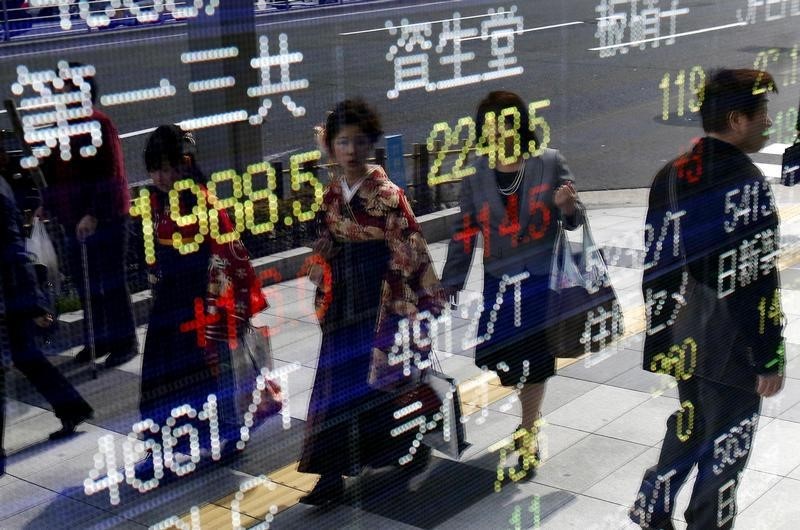
Investing.com-- Asian stocks were mixed on Wednesday with equities in Australia and Malaysia leading losses amid renewed uncertainty over U.S. President Donald Trump’s trade policies, while South Korean shares jumped tracking a modest rebound in U.S. tech giants.
Major U.S. stock indexes extended their biggest sell-off in months on Tuesday, rattled by Trump’s shifting stance on tariffs.
Malaysia, Philippines markets slide amid trade tensions
President Trump on Tuesday announced an increase in tariffs on Canadian steel and aluminum imports to 50%, only to retract the decision hours later, reinstating the original 25% tariffs.
This abrupt policy reversal has contributed to heightened volatility in global financial markets.
The initial announcement of the tariff hike raised concerns about escalating trade tensions between the U.S. and its trading partners, prompting investors to reassess risks associated with international trade.
The subsequent reversal of the decision added to the unpredictability, further unsettling investor confidence.
Most Asian markets, which are highly sensitive to global trade dynamics, reacted negatively to these developments.
As of 02:37 GMT, China’s Shanghai Composite inched 0.2% lower, while the Shanghai Shenzhen CSI 300 index lost 0.3%.
Hong Kong’s Hang Seng index was largely muted.
Malaysia’s KLCI index dropped 1.5%, while the Philippines’ PSEi Composite declined 1.2%.
Aussie stocks briefly enter correction territory as US rules out tariff exemption
Australia’s S&P/ASX 200 index slipped as much as 1.6% on Tuesday, briefly entering a market correction territory.
It was currently trading 1.3% lower at 7,786.30 points.
Australian Prime Minister Anthony Albanese said the country will not impose reciprocal tariffs on the U.S., despite President Trump ruling out exemptions on steel and aluminum tariffs.
This comes after Trump initially suggested considering an exemption for Australia but later confirmed the 25% tariffs would apply to all countries.
S. Korea shares rebound as tech gains
South Korea’s KOSPI jumped 1.6% with tech heavyweights Samsung Electronics (KS:005930), and SK Hynix Inc (KS:000660) advancing 2.1%, and 4.5%, respectively.
U.S. tech giants such as NVIDIA Corporation (NASDAQ:NVDA), Broadcom Inc (NASDAQ:AVGO), and Tesla Inc (NASDAQ:TSLA) saw a slight rebound on Tuesday, after sharp declines on Monday, splashing some gains into the Asian tech sector.
Japan’s Nikkei 225 inched 0.3% higher after plunging to a six-month low in the previous session. TOPIX rose 0.9%.
Futures for Nifty 50 edged up 0.2% on Wednesday.
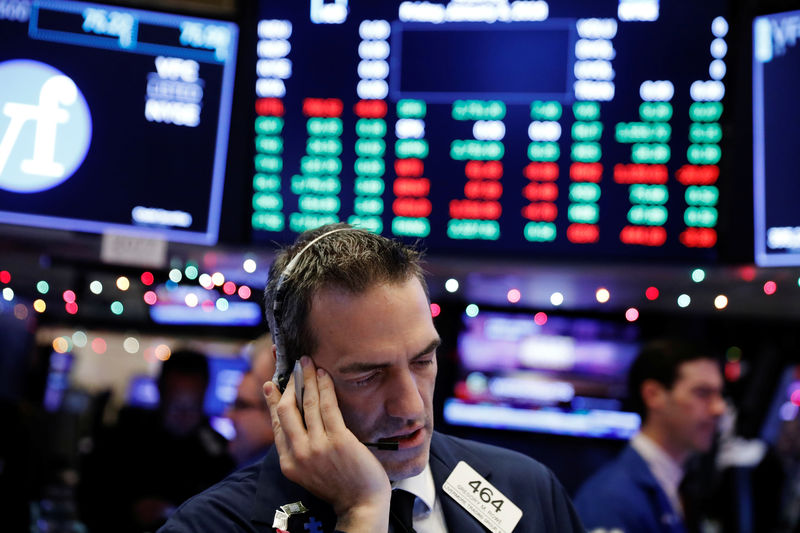
U.S. stock index futures inched higher on Tuesday evening following a continued sell-off on Wall Street, as investors grappled with uncertainty over President Donald Trump’s fluctuating tariff policies.
S&P 500 Futures edged up 0.3% to 5,594.25 points, while Nasdaq 100 Futures rose 0.4% to 19,473.0 points by 19.49 ET (23:49 GMT). Dow Jones Futures edged 0.2% higher to 41,556.0 points.
Tariff flip-flop: Trump scraps 50% hike hours after announcement
President Donald Trump on Tuesday announced an escalation in trade tensions by declaring a 50% tariff on Canadian steel and aluminum imports, up from the existing 25%.
This abrupt decision was in direct response to Ontario’s imposition of a 25% surcharge on electricity exports to the U.S. The heightened tariffs were intended to pressure Canada into revising its trade policies.
However, within hours, a rapid de-escalation occurred. Ontario Premier Doug Ford agreed to suspend the electricity surcharge and scheduled a meeting with U.S. Commerce Secretary Howard Lutnick in Washington.
In response, President Trump rescinded the 50% tariff threat, reverting to the original 25% rate on Canadian metals.
While the immediate threat of escalating tariffs was averted, investors remained cautious, recognizing that such abrupt policy shifts can have swift and significant impacts on market dynamics.
Dow, S&P 500 extend declines; CPI data awaited
In regular trading on Tuesday, the S&P 500 fell 0.8%, while the Dow Jones Industrial Average declined 1.1%. NASDAQ Composite closed 0.2% lower after slumping 4% on Monday.
Tesla Inc (NASDAQ:TSLA) shares saw a slight rebound, rising 3.7% after a 15% drop on Monday.
President Trump showcased support for Elon Musk’s Tesla by checking out a red sedan on the White House driveway, amid backlash over Musk’s ties to his administration and government downsizing efforts.
NVIDIA Corporation (NASDAQ:NVDA) gained 1.8%, while Broadcom Inc (NASDAQ:AVGO) closed 3.1% higher.
Delta Air Lines Inc (NYSE:DAL) fell over 7% after issuing a profit warning, extending Monday’s losses.
The airline now expects first-quarter EPS of $0.30-$0.50, down from $0.70-$1.00, with revenue growth revised to 3%-4% from 7%-9%, citing weak domestic demand and economic uncertainty.
Market participants now keenly await the crucial consumer price inflation report due this week, which will provide key insights ahead of the Federal Reserve’s interest rate decision scheduled for next week.

By Alessandro Parodi
(Reuters) - China in February again led purchases of electric vehicles, which increased worldwide versus a year ago, even as European Union tariffs on China-made EVs reduced sales of some brands, research firm Rho Motion said on Wednesday.
Overall sales, including battery electric and plug-in hybrid vehicles, rose by 49% in February year-on-year to 1.2 million, but the researchers said the figure was distorted by the timing of Chinese New Year.
Compared with January, figures were down 3%.
The EU imposed tariffs on China-made cars at the end of October after an anti-subsidy investigation.
Rho Motion Data Manager Charles Lester said sales of MG, which is owned by China’s SAIC and was hit by some of the biggest tariffs, had fallen sharply.
SAIC’s sales growth of cars made in China was on average 19% lower in the months between November 2024 and January 2025 in Europe and European Economic Area, compared to the January to October 2024 period, Lester said.
Sales of Honda (NYSE:HMC), which produces some battery-electric (BEV) models of the Dongfeng Honda brand in China, Mercedes, Geely, Tesla (NASDAQ:TSLA), Renault (EPA:RENA)’s Dacia Spring and smaller Chinese brands Nio (NYSE:NIO) and Xpeng (NYSE:XPEV), were also impacted by the tariffs, Lester said.
BYD (SZ:002594), however, is gaining ground in Europe and increasing its market-share worldwide despite the tariffs, he said.
Because of the timing of Chinese New Year holidays this year, China recorded a yearly increase of 76% in February, and of 35% for the first two months of the year.
Sales in Europe were up 19% in the month compared with a year earlier - the second consecutive month of double-digit growth since EU CO2 emission targets came into effect - with Germany up 40% in the first two months of 2025.
North America’s EV sales grew by 17% in the month from a year before, but U.S. President Donald Trump’s stance towards electrification will lead to reduced yearly forecasts for the country, Lester said.
Mexico’s EV market more than doubled due to Chinese EV imports that started "in bulk" last year, Rho Motion said in a statement.
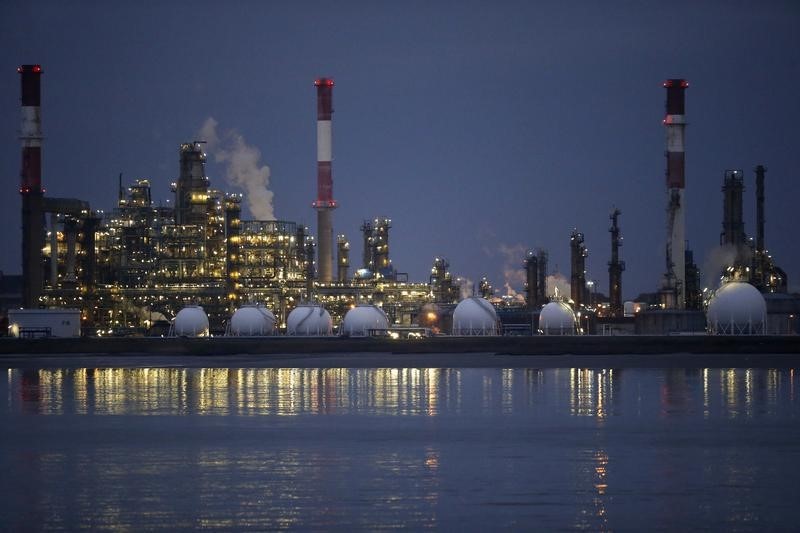
Oil prices fell in Asian trade on Tuesday, coming back in sight of an over three-year low amid growing concerns that a global economic slowdown and escalating trade war will dent demand.
Crude prices were nursing steep losses over at least the past three weeks, as uncertainty over U.S. President Donald Trump’s tariff agenda grew after his flip-flopping on tariffs against Canada and Mexico.
Trump’s imposition of 20% tariffs on China- the world’s biggest oil importer- also dented sentiment, as Beijing retaliated with its own measures.
But the biggest weight on oil prices was growing fears of a U.S. economic slowdown, especially as Trump embarks on a major overhaul of trade practices and government policies. Trump in a recent interview declined to rule out the possibility of a recession.
Brent oil futures expiring in May fell 0.7% to $68.77 a barrel, while West Texas Intermediate crude futures fell 0.8% to $65.15 a barrel by 21:23 ET (01:23 GMT).
US recession fears batter oil markets
Fears of a U.S. economic slowdown grew in recent weeks, especially amid increased disruption from Trump’s agenda. The 47th U.S. President announced a host of measures to slash government spending, reduce federal workers, and hash out new trade agreements through increased tariffs.
Trump on Sunday declined to rule out the possibility of a recession, stating that he expected his agenda to cause some near-term disruption. He repeated his threats that plans for higher trade tariffs will come through in early-April.
Fears of a recession were also furthered by weak readings on retail spending and the labor market for the first two months of 2025. Markets fear that worsening growth in major economies, especially the U.S., will dent oil demand in the coming months, and could especially hurt prices if supply increases.
U.S. inflation data due later in the week is set to provide more cues on the economy.
Weak inflation data from China, released over the weekend, also showed the country was still struggling to shore up local demand. Beijing’s promises of more stimulus support were met with muted enthusiasm in recent weeks.
Increased supply bets weigh on oil
Trump’s plans to bring down energy prices also weighed, after he signed orders to ramp up domestic production. He also called on the Organization of Petroleum Exporting Countries to increase output- a demand the cartel complied with last week.
A mix of slowing demand and rising supplies stand to severely dent oil prices in the coming months.
Focus this week is on the OPEC’s monthly report, due on Wednesday, for more cues on demand forecasts and the cartel’s plans for production.
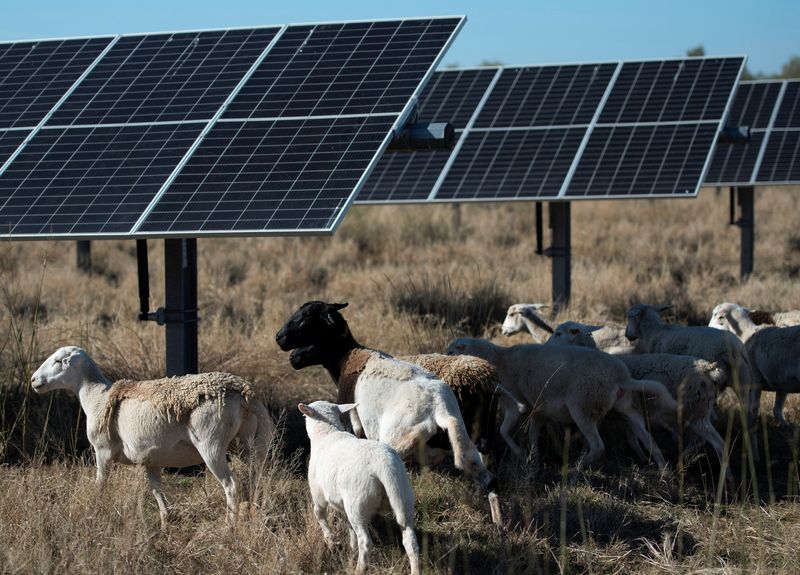
(Reuters) - Solar energy accounted for 84% of new electricity generation capacity added to the U.S. power grid last year, but the industry faces a challenging future with the new U.S. administration’s energy policies, a report published on Tuesday said.
The country installed 50 gigawatts (GW) of new solar capacity in 2024, the Solar Energy Industries Association (SEIA) and Wood Mackenzie groups said in the report, adding that 2024 was largest single year of growth by any energy technology in over two decades.
WHY IT IS IMPORTANT
The solar industry was a major beneficiary of subsidies contained in former President Joe Biden’s landmark 2022 climate change law, the Inflation Reduction Act (IRA).
The Trump administration has said it was reviewing federal funding plans, and any removal of tax credits issued under the 2022 Inflation Reduction Act would impact clean energy deployment.
The clean-energy sector has been on high alert since the election of Donald Trump, whose first executive orders prioritized unleashing U.S. fossil-fuel production, paused federal wind projects and froze funding for clean-energy projects from two Biden-era laws.
BY THE NUMBERS
Total U.S. solar capacity is expected to reach 739 GW by 2035, the report said, warning that changes to federal tax credits, supply chain availability, and permitting policy will cause slowdown in solar deployment.
The low case forecast showed a 130 GW decline in solar deployment over the next decade compared to the base case, representing nearly $250 billion of lost investment, according to the report.
KEY QUOTES
"Last year’s record-level of installations was aided by several solar policies and credits within the Inflation Reduction Act that helped drive interest in the solar market," said Sylvia Levya Martinez, Principal Analyst, North America Utility-Scale Solar for Wood Mackenzie.
"We still have many challenges ahead, including unprecedented load growth on the power grid. If many of these policies were eliminated or significantly altered, it would be very detrimental to the industry’s continued growth."

By Pranoy Krishna
BENGALURU (Reuters) -India’s February consumer inflation likely eased below the Reserve Bank of India (NSE:BOI)’s medium-term target of 4.0% for the first time in six months on moderating food price rises, a Reuters poll showed, bolstering expectations of interest rate cuts.
As fresh winter produce hit markets over the past few months, food items - which make up nearly half of the inflation basket - saw a sustained slowdown in price increases.
That marked a welcome reprieve from supply disruptions last year when unpredictable monsoons and intense heat waves sent food prices soaring, often by double digits.
A Reuters poll of 45 economists taken March 4–10 predicted inflation as measured by the annual change in the consumer price index fell to 3.98% in February from 4.31% in January.
Forecasts for the data, set to be released on March 12 at 1030 GMT, ranged from 3.40% to 4.65%, with nearly 70% of respondents expecting it to come in at or below the RBI’s medium-term target of 4.0%. Only five predicted it would exceed January’s reading.
"We see a continued slowdown in vegetable price rises," said Gaura Sengupta, chief economist at IDFC First Bank (NASDAQ:FRBA).
"The other, even more positive fact is that we are also seeing softness in pulse prices as well as cereals, which are the most sticky part of food inflation because their harvest season is not as frequent."
With inflation comfortably within the RBI’s 2–6% target range, economists say the central bank is likely gearing up for another interest rate cut in April to support slowing economic growth, following a quarter-point reduction in February.
A separate Reuters poll showed it would be a short and shallow rate-cutting cycle.
Meanwhile, warnings from the India Meteorological Department that summer and heatwaves could start early have raised concerns that inflation could rise again once winter supplies start to run out.
"We do expect the correction in vegetable prices to start reversing possibly as early as March, with risks from heatwaves and weather-related disruptions to crops," wrote Rahul Bajoria, India & ASEAN economist at Bank of America.
His team projects headline CPI inflation at 4.8% this fiscal year but expects it to edge down to 4.1% in the next year, with risks evenly balanced from lower commodity prices and a weaker rupee.
That’s in line with predictions of 4.8% and 4.3% in a Reuters poll conducted last month.
Core inflation, which excludes the more volatile food and energy components, was expected to have inched up slightly to 3.82% year-on-year in February from January’s estimated 3.70%.
Wholesale price index-based inflation was expected to have risen to 2.36% in February from 2.31% in January, the survey showed.
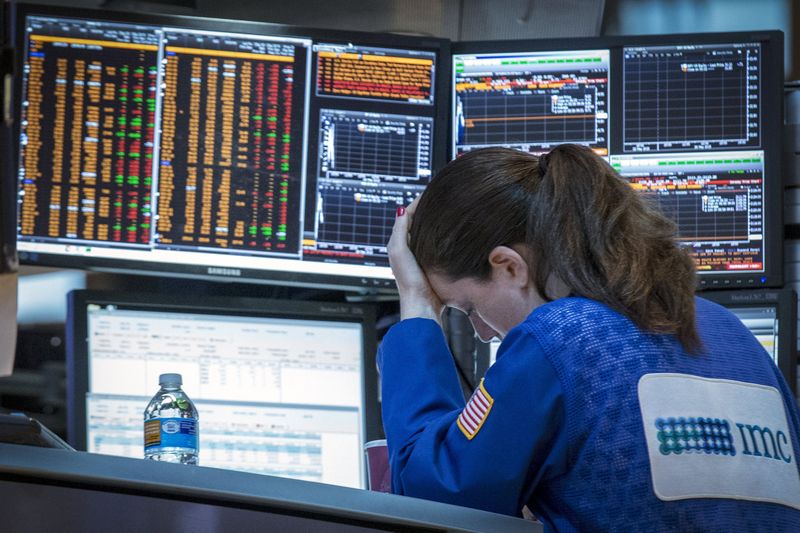
Investing.com-- U.S. stock index futures fell Monday evening after steep declines on Wall Street, as investors weighed recession risks stemming from President Donald Trump’s tariff policies.
S&P 500 Futures fell 0.5% to 5,595.0 points, while Nasdaq 100 Futures dropped 0.8% to 19,306.0 points by 20:02 ET (00:02 GMT). Dow Jones Futures were largely unchanged at 41,965.0 points.
Recession fears spark sell-off, Nasdaq slumps 4%
A Reuters poll showed that economic risks are escalating for Mexico, Canada, and the U.S. due to the turbulent rollout of Trump tariffs, creating significant uncertainty for businesses and policymakers.
Concerns over inflation in the U.S., which were already growing, have intensified, making it more likely that the Federal Reserve will hold off on policy changes for the foreseeable future. Meanwhile, the risk of recession is increasing across all three countries, according to the survey.
Trump has refrained from predicting whether the U.S. might experience a recession in 2025 amid escalating trade tensions.
Stock markets experienced notable declines on Monday, with the S&P 500 falling 2.7%, the Dow Jones Industrial Average 2%, and the NASDAQ Composite slumping 4%, primarily driven by substantial losses in major technology companies.
Tesla Inc (NASDAQ:TSLA) shares saw a 15% drop, while market darling NVIDIA Corporation (NASDAQ:NVDA) stocks fell 5.1%.
Broadcom Inc (NASDAQ:AVGO) shares fell 5.4%, while Arm Holdings (NASDAQ:ARM) stock declined 7.3%.
Tracking the downturn in Bitcoin, shares of Strategy, previously known as MicroStrategy (NASDAQ:MSTR), slumped 16.7%. Coinbase Global Inc (NASDAQ:COIN) stock plunged 17.6%.
Govt shutdown risks add to the negative mood; US CPI awaited
A government shutdown is possible if Congress fails to pass a temporary funding bill before the fiscal deadline on March 14.
The Republican-controlled House introduced a six-month stopgap spending bill on March 8, with a vote scheduled for Tuesday.
If approved by Congress, the proposal will require 60 votes in the Senate to reach Trump’s desk, necessitating some Democratic support to avert a government shutdown.
Meanwhile, market participants now keenly await the crucial consumer price inflation report due on Wednesday, which will provide key insights ahead of the Federal Reserve’s interest rate decision scheduled for next week.
Last week, Fed Chair Jerome Powell indicated that the central bank would maintain a patient stance on interest rates, saying the central bank was cautiously assessing Trump’s recent economic policy changes, including tariffs and federal worker layoffs.

